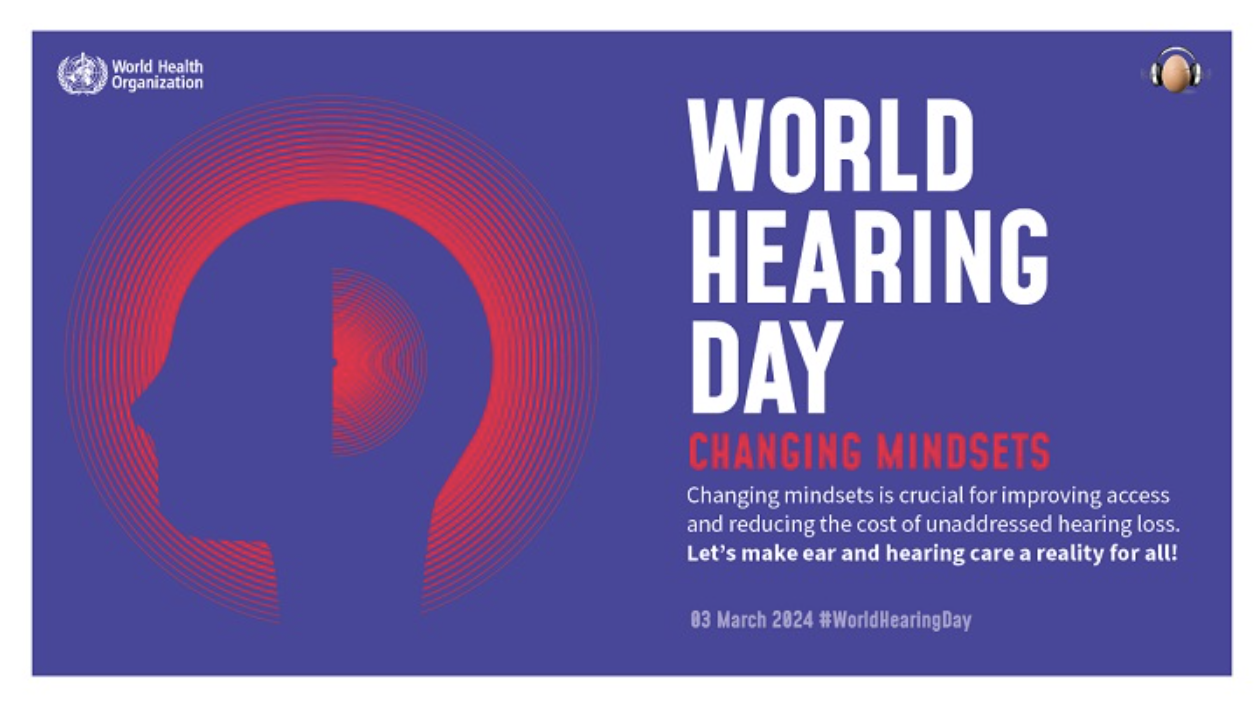My sudden sensorineural hearing loss journey
April 3, 2023Upgrading my 1990s hearing technology with revision surgery
April 12, 2023World Health Day – Health For All

On April 7th, the World Health Organization (WHO) will celebrate World Health Day with the theme Health For All. The date also coincides with the 75th anniversary of WHO.
What is the WHO?
The World Health Organization (WHO) is a specialized United Nations (UN) body. They are in charge of coordinating global initiatives to enhance public health. It was founded in 1948 and is based in Geneva, Switzerland.
The primary goals of the WHO are to advance and safeguard human health. This includes taking the lead in matters of international health, establishing guidelines and standards, and assisting nations with technical assistance. Some concerns WHO addresses include: Infectious diseases, noncommunicable diseases, mental health, and environmental health. They also place a strong focus on the improvement of health systems.
The History Behind World Health Day
World Health Day is an important global event that serves as a reminder of the crucial role that health plays in our lives. This annual observance aims to raise awareness about the current status of global health. Furthermore, it also encourages individuals, communities, and governments to take action toward achieving better health outcomes for all. With a different theme each year, World Health Day provides a platform for discussions on important health issues. Past themes have included Universal Health Coverage, Food Safety, and Our Planet, Our Health.
WHO’s Sustainability Mission
The WHO explains on its website: “Health For All envisions that all people have good health for a fulfilling life in a peaceful, prosperous, and sustainable world.”
For member states, which are nations that have joined the WHO, World Health Day helps to raise awareness for strong health systems. At the same time, it aims to achieve the Sustainable Development Goals. Additionally, the WHO highlights the need for universal health coverage and emergency preparedness, healthy living environments, and health taxes on tobacco, alcohol, added sugar, and fossil fuels.
As there is a projected shortfall of 10 million health workers worldwide by 2030, investment in education and job creation for the health sector is highly important. WHO suggests nations measure success by people’s well-being and healthy environments. Undoubtedly, this will empower individuals, families, and communities. It can also increase social participation and enhanced self-care in health, and strengthen integrated national health systems.
Health and Hearing Loss
Hearing loss is a critical issue that directly relates to the theme of Health For All. Hearing loss can significantly impact an individual’s access to healthcare, education, and employment opportunities. This can lead to a reduction in their overall well-being and quality of life. Moreover, hearing loss can often go undiagnosed and untreated, particularly in low- and middle-income countries, further exacerbating health inequalities.
“Hearing loss is a critical issue that directly relates to the theme of Health For All.”
Therefore, ensuring access to hearing healthcare services and interventions for all is crucial to achieving Health For All. This includes raising awareness about hearing loss, providing affordable hearing aids and assistive technology, ensuring access to early detection and treatment of hearing loss, and supporting individuals with hearing loss to fully participate in their communities. Finally, by addressing hearing loss as part of a comprehensive approach to health, we can work towards a world where all individuals, regardless of hearing abilities, have the opportunity to lead healthy, fulfilling lives.
Read more: WHO adopts resolution on prevention of hearing loss
Statistics
Below are some basic facts about healthcare around the world right now.
- Over 5% of the world’s population – or 430 million people – require rehabilitation to address their disabling hearing loss (432 million adults and 34 million children)
- It is estimated that by 2050 over 700 million people – or 1 in every 10 people – will have disabling hearing loss.
- 30% of the global population is not able to access essential health services.
- Almost two billion people face catastrophic or impoverishing health spending, with significant inequalities affecting those in the most vulnerable settings.
- 800 million people spend at least 10 percent of their household budgets on healthcare.
- 51.5 million adults in America experienced mental illness in 2019.
- 5.2 million children under 5 years died mostly from preventable and treatable causes in 2019.
How to Help:
- Inform yourself!
- Spread the message!
- Use hashtags: #HealthForAll and #WHO75
- Collaborate with health advocates and leaders to rally your community and demand the right to receive high-quality medical care without facing financial hardship.
- What does Health For All mean to you? Write an article, post a photograph, paint a picture to describe how the theme impacts you. Encourage others in your community to do the same.
- Involve schools, universities, and youth networks to organize events like walks, marathons, art competitions, and debates to spark conversation about your community’s health issues.



